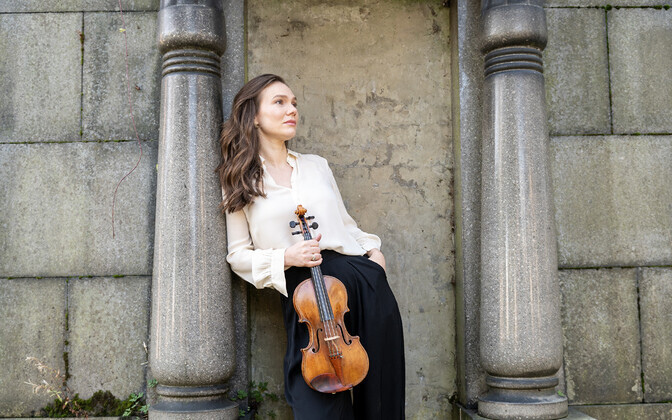From village halls to churches, indoor markets to railway stations, for the past quarter of a century, the Two Moors Festival has brought some of the world’s best classical musicians to perform at unique venues across England’s rural southwest.
This year, to mark the festival’s 25th anniversary, artistic director and violinist Tamsin Waley-Cohen was “looking for a really exciting commission.” When Waley-Cohen’s long-time collaborator — percussionist Colin Currie — suggested asking top Estonian composer Erkki-Sven Tüür to get involved, it seemed like a perfect fit.
“Erkki-Sven is a major international composer,” Waley-Cohen points out, adding that both she and Currie had admired Tüür’s work for a long time. “I hadn’t worked with him before, I was just thrilled that he agreed — I think he really wanted to work with Colin,” she laughs.
Tüür didn’t just agree to work with Currie and Waley-Cohen – he was so enthusiastic about their collaboration, he postponed another project to write new music for the Two Moors project.
“We were really fortunate that he was so keen,” Waley-Cohen admits.
Island sound
For Estonians, Erkki-Sven Tüür needs little introduction.
After leading a King Crimson and Frank Zappa-inspired pro-rock band in the 1970s, by the late ’80s, the Hiiumaa-born musician had reinvented himself as a classical composer.
Today, Tüür’s music — characterized by an intense, transformative energy — is performed by orchestras around the globe.
“Erkki-Sven has such a distinctive sound world, “Waley-Cohen explains. “Great composers create something that didn’t exist before — they invent their own musical universe. And that’s what he’s done.”
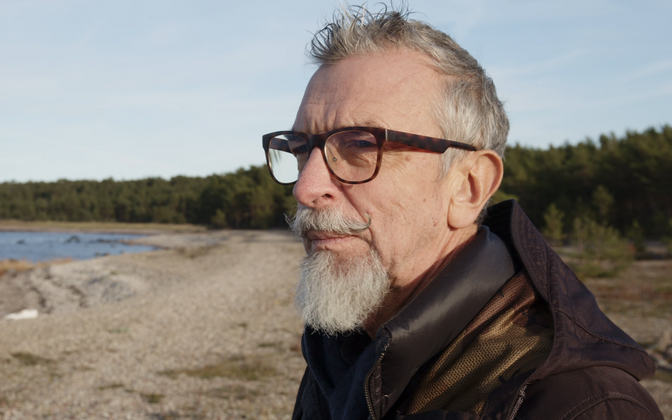 Erkki-Sven Tüür. Source: ERR
Erkki-Sven Tüür. Source: ERR
Waley-Cohen describes the 25-minute work Tüür created as “a really significant piece,” filled with “rich, layered harmonies” and “incredible colors.” It is, she says, a reflection of the composer’s own life and musical journey.
“The sound of the violin and strings with the percussion is very unique and unusual – it gives the piece some really incredible textural possibilities,” Waley-Cohen says. “From the first rehearsal, we’re going to hear them all come to life.”
Forces of nature
It is in early October when I speak to Waley-Cohen on Zoom.
She’s in Exmoor — one of the two “very sparsely populated and really wild” national parks, along with neighboring Dartmoor — where the Two Moors Festival has been held each autumn since 2001.
“They’re wildernesses in the best sense — you feel the full force of nature,” Waley-Cohen says of the place, where she spent family holidays as a child. “The landscape is very unspoiled and there are parts you can’t really even traverse.”
In addition to being extremely picturesque, “it’s also sometimes inhospitable,” she says. “It’s got the feeling of being very, very ancient and that we’re just passing through it — and I think that’s a beautiful thing.”
It’s hard not to compare the landscape visible through the window behind Waley-Cohen as we speak with the natural environment so characteristic of Hiiumaa — the Estonian island where Erkki-Sven Tüür grew up and that continues to influence his work.
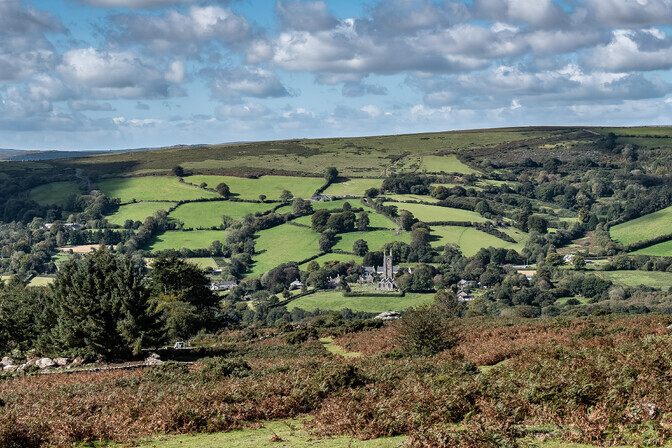 The Two Moors Festival has been bringing world class classical music to the south west of England for 24 years. Source: Press materials
The Two Moors Festival has been bringing world class classical music to the south west of England for 24 years. Source: Press materials
With dense forest on one side and open sea on the other, Hiiumaa can feel like a place at the end of the Earth, the composer told ERR in January. That also makes it the perfect setting for him to write music “for the whole world.”
“This combination is extremely inspiring. There is a mysterious vertical dimension in the forest, and when you reach the sea, the horizontal, the vastness, becomes dominant,” Tüür said. “It is the moment when these two meet that fascinates me most about this place.”
Inner stillness
The Two Moors Festival collaboration between Tüür, Currie and Waley-Cohen is more than simply a meeting of musical minds. Supported by the Estonian Cultural Attaché to the U.K., it also represents a genuine cultural connection between distinguished representatives of the two countries.
“It’s really meaningful for us,” says Waley-Cohen. “We’re a relatively small festival, so to have someone of [Tüür’s] stature writing for us is a dream.” She sees Estonia as a country that, culturally, “punches above its weight,” particularly in the classical music scene, where Estonian musicians are a staple on the international circuit.
Still, Waley-Cohen admits, like many people in Britain, her first point of contact with Estonian music was the work of the great Arvo Pärt.
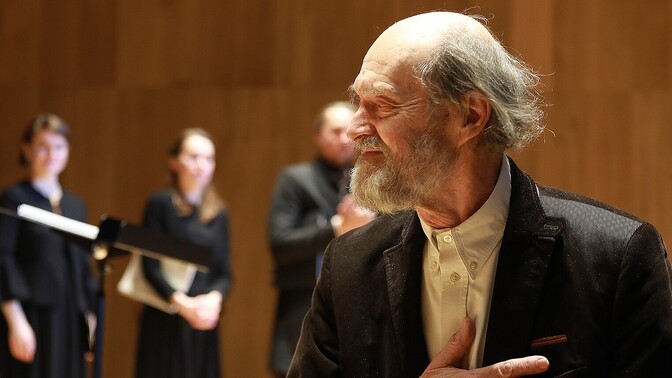 Arvo Pärt. Source: Birgit Püve.
Arvo Pärt. Source: Birgit Püve.
“Whenever I’m talking to promoters and one of my program options includes playing a piece by Arvo Pärt, they always want it,” says Waley-Cohen. “U.K. audiences love his music, and they know that if it’s on the program, people are going to come.”
This year, as Pärt celebrates his 90th birthday, tribute concerts are taking place around the world – with even an entire festival in Oxford dedicated to his life and music this November. A further sign of the enduring power of music to speak without words of our collective human experience.
“[Pärt’s] work really creates a kind of inner stillness,” Waley-Cohen says. “And we are all craving that right now in this modern world.”
Sense of communion
The moors of southwest England may feel a long way from the Estonian island of Hiiumaa. Yet both evoke a strong sense of place that profoundly impacts the music they inspire.
Erkki-Sven Tüür sees music as a flow of energy — “touching the stars, but also where you stand with both feet on the ground. Music is always somewhere, and it never ends; it is a perfect idea,” the composer told ERR.
“How someone brings it to life is the question.”
Tamsin Waley-Cohen is also a strong believer in music’s ability to bring people together. “It’s the only art form which doesn’t require you to have a shared language or even shared references for it to go straight to the heart,” she says.
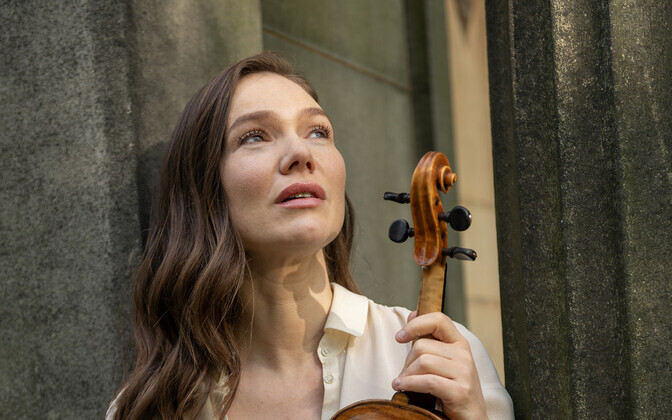 Tamsin Waley-Cohen. Source: Press materials
Tamsin Waley-Cohen. Source: Press materials
“And because it is so abstract — you can’t touch it or see it — there’s something in that impermanence that’s really important in our modern-day world. It’s created for a moment, for the people who are actually there.”
Shared experiences like Tüür’s performance at the Two Moors Festival, Waley-Cohen tells me, create “a sense of communion” — a connection not only to the music but between those who are there together to share it in the moment it is created.
“You could be with strangers or with whoever else is in the audience,” Waley-Cohen says. “And I think that’s a really, really powerful thing.”
***
More information about the Two Moors Festival is available here.
—
